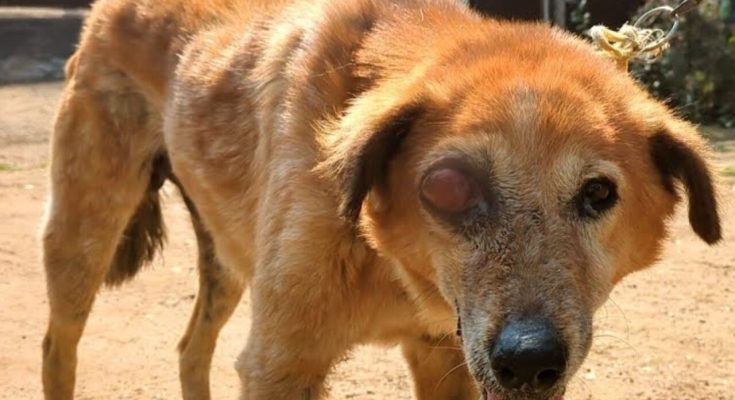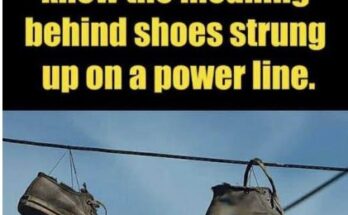A small dog, no larger than a loaf of bread, darted into the flow of traffic on a busy street, its paws barely making a sound against the hot pavement. Horns blared and tires screeched, but in an instant, the worst happened — a car clipped the little creature. The impact wasn’t fatal, but it was devastating. The dog tumbled across the asphalt, whimpering in pain, its small frame trembling. Passersby gasped but hesitated, unsure of what to do amid the chaos.

Among the crowd, an elderly man stood frozen for a moment. His heart ached at the sight before him. Without thinking further, he hurried into the street, weaving through cars to reach the injured animal. When he knelt down beside the dog, he saw something shocking — one of the dog’s eyes had been violently dislodged from its socket. It dangled grotesquely, a sight that would have made many turn away. But not this man. His hands, though weathered by time, were steady and gentle as he cradled the dog in his arms, wrapping it carefully in his worn jacket.

Murmuring soft reassurances, he hurried toward the nearest animal shelter, his old legs moving faster than they had in years. Upon arrival, the staff immediately rushed the little dog into an emergency treatment room. The veterinarians examined the extent of the injuries and confirmed what the man already feared — the damaged eye could not be saved.
Preparations for surgery began without delay. Over the next two tense hours, the veterinary team worked meticulously to remove the injured eye, clean the wounds, and stabilize the fragile dog. Throughout the procedure, the elderly man remained in the waiting room, sitting stiffly in a chair, his hat clutched tightly in his hands, his eyes never straying far from the operating room door.
Finally, a veterinarian emerged, offering a small, tired smile. The surgery had gone as well as it could. The dog, though now one-eyed, had survived.

The next few days were critical. The dog, now blind on one side, was placed in a soft, warm recovery bed. Volunteers took turns tending to him, administering medication, changing bandages, and offering soft words and comforting touches. At first, the little dog was too frightened to eat or move. He whimpered softly at unfamiliar sounds, shrinking away from human contact.
But something remarkable began to happen.
Slowly, the dog started to respond. First, with tiny movements of his head toward familiar voices, then by accepting small bites of food from trusted hands. He seemed to realize that he was safe. His body grew stronger. His tail gave a tentative wag.

The staff decided he needed a name — something to mark his survival and spirit. They named him Lucky.
Meanwhile, the elderly man returned to the shelter often, bringing small treats and speaking softly to Lucky through the bars of the kennel. With every visit, Lucky’s eyes — or rather, his one good eye — would light up just a little more.
Weeks passed, and Lucky transformed. Despite his loss, he adapted to his new reality with incredible courage. He learned to navigate rooms by sound and scent, his small paws confidently tapping against the floors. He could still chase a ball, greet visitors, and curl up in a sunny spot for long naps.

One crisp morning, the elderly man came to the shelter with a firm resolve. Paperwork was signed, final checks were completed, and at last, Lucky was officially his.
The man took Lucky home to a modest little house with a garden full of flowers and shaded corners perfect for afternoon dozing. There, Lucky blossomed further. He explored his new world fearlessly, leaping after falling leaves, basking in sunbeams, and curling up on the old man’s lap in the evenings.
In time, it was clear that Lucky was not just surviving — he was thriving.
Despite the trauma and loss he had endured, Lucky proved that happiness can be found after hardship, and that sometimes, the greatest joys come after life’s greatest trials. Lucky and the elderly man, two souls once lost in their own ways, had found in each other a new beginning — one built on love, resilience, and the simple beauty of second chances.




